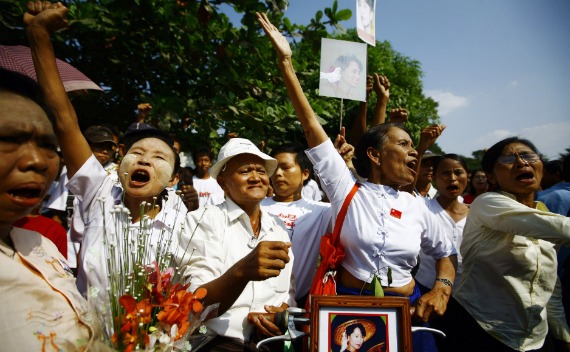Could Burma Be Egypt?
More on:

In today’s Asia Times, longtime Burma activist Aung Din wonders whether Burma, surely one of the most repressive states in the world, could follow the example of Arab protestors in countries from Egypt to Oman to Libya. The Burmese, after all, have not been shy about standing up before, from the massive 1988 protests that eventually led to a free election in 1990 that was annulled to the “Saffron Revolution” of tens of thousands of monks in Rangoon four years ago. And, as Aung Din notes, there are some similarities between regimes like Egypt and Burma – the nepotism and venality of high levels of the government: In Burma, a video leaked to YouTube showed the wedding of Senior General Than Shwe’s daughter, an almost-royal affair in which she was showered with gifts and wore enough diamonds to shame even Naomi Campbell.
But, though I wish otherwise, I don’t think Burma is going to follow Egypt any time soon. For one, the Burmese military, unlike the Egyptian one (but similar to Muammar Gadaffi’s loyal forces) has proven, time and again, willing to gun down its own people to maintain the regime’s control. Whether in 1988, or 2007, or many times before, Burmese soldiers have followed orders, and the top levels of the regime did not split, providing an opportunity for pro-democracy protestors to take advantage.
In addition, though cellphones and social media have begun to spread in Burma, their coverage within the country is miniscule compared to most Arab nations. The price of cellphones in Burma is still kept staggeringly high by the regime, to limit their spread, and the Internet is much more tightly controlled than in most Arab-Muslim nations. Though some activists did use cellphone cameras and the Internet to get photos of the Saffron Revolution out to the world, it is doubtful that they could be used as a device to foment mass protest within Burma.
Finally, despite their seeming xenophoboia and isolation, the Burmese generals have learned to play the international community very well. Using the backing of China, they have pushed the U.S. to reconsider its relationship with the country–and likely will offer the world little payoff for new engagement. A Burmese spring, alas, seems far off.
More on:
 Online Store
Online Store